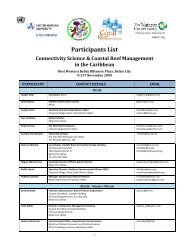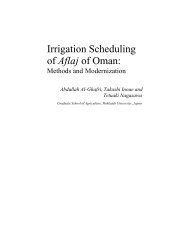The Global Water Crisis: Addressing an Urgent Security - Unu-inweh ...
The Global Water Crisis: Addressing an Urgent Security - Unu-inweh ...
The Global Water Crisis: Addressing an Urgent Security - Unu-inweh ...
You also want an ePaper? Increase the reach of your titles
YUMPU automatically turns print PDFs into web optimized ePapers that Google loves.
1. <strong>Water</strong> <strong>Security</strong> as a National Political Issue<br />
Grey <strong>an</strong>d Sadoff (2007: 546) define water security as “harnessing the productive potential of water <strong>an</strong>d limiting its<br />
destructive impact”. <strong>Water</strong> security has emerged as a crisis of global proportions, with major implications for national<br />
<strong>an</strong>d regional stability <strong>an</strong>d conflict. Furthermore, water security is a decisive component of social <strong>an</strong>d political security.<br />
This c<strong>an</strong>not be truer th<strong>an</strong> in the WANA region, where most of the countries are situated in a semi-arid to arid climatic<br />
zone where more th<strong>an</strong> 60% of the renewable water resources in the region are shared by one or more countries. Despite<br />
warnings by regional experts that the wars of the 21 st century will be fought over water (WANA Forum, 2010a), in the<br />
Arab-Israeli wars of 1967 <strong>an</strong>d 1978, <strong>an</strong>d in the tension between Leb<strong>an</strong>on <strong>an</strong>d Israel in 2002 <strong>an</strong>d the subsequent war in<br />
2006, water was the primary cause. In the absence of peace, <strong>an</strong>d continual disregard of international hum<strong>an</strong>itari<strong>an</strong> law,<br />
water security is leading to increased tensions, instability <strong>an</strong>d conflict. Examples of water conflicts in the following river<br />
basins in the WANA region have already been experienced:<br />
• Syria - Turkey - Iraq (Euphrates <strong>an</strong>d Tigris rivers)<br />
• Israel - Jord<strong>an</strong> - Palestine (Jord<strong>an</strong> River, Dead Sea)<br />
• Israel - Palestine (groundwater aquifers of Occupied Territories)<br />
• Jord<strong>an</strong> - Saudi Arabia (Al-Disi Aquifer)<br />
• Syria - Jord<strong>an</strong> (Yarmouk River)<br />
• Egypt - Sud<strong>an</strong> - Ethiopia (among 10 countries sharing the Nile River)<br />
• Ir<strong>an</strong> - Afgh<strong>an</strong>ist<strong>an</strong> (Hirm<strong>an</strong>d River)<br />
Each of the countries in the region considers water security to be of national concern. For example, water security is key to<br />
establishing peace between the Palestini<strong>an</strong>s <strong>an</strong>d Israelis. As expressed by Nabil Al Sharif, former Minister of the Palestini<strong>an</strong><br />
<strong>Water</strong> Authority: “<strong>The</strong>re will be no real peace if there is no water. If there is no water, I don’t think <strong>an</strong>y agreement of peace<br />
will live more th<strong>an</strong> two or three years” (Vigotti <strong>an</strong>d Hoffm<strong>an</strong>, 2009). To shed light on the seriousness of the conflict over<br />
water in the region, in June 2002, Leb<strong>an</strong>on restarted new infrastructure works to connect 60 communities to running<br />
water for domestic use, supplying them with 10,000 m³ of water for domestic purposes a day (or 3.65 million m³ a year).<br />
For Israel, these unilateral Leb<strong>an</strong>ese acts were a violation of international law <strong>an</strong>d a threat to the water security of their<br />
country. Leb<strong>an</strong>on, referring to the 1953 Johnston Pl<strong>an</strong> which gr<strong>an</strong>ted Leb<strong>an</strong>on 35 million m³ of the Jord<strong>an</strong> (Hasb<strong>an</strong>i)<br />
River headwaters (Abujaber, 1989) argued that the move was in accord<strong>an</strong>ce with the principle of equitability in its water<br />
share, <strong>an</strong>d was therefore in accord<strong>an</strong>ce with international water law. Israel however, feeling threatened that their water<br />
security was at risk even when the amount of water used by the Leb<strong>an</strong>ese is less th<strong>an</strong> 0.5% of the Israeli’s <strong>an</strong>nual water<br />
consumption, was ready to take up arms to stop the measures taken by Leb<strong>an</strong>on. <strong>The</strong> case was brought before the United<br />
Nations, <strong>an</strong>d only through intervention by ambassadors of the Europe<strong>an</strong> Union <strong>an</strong>d UN officials to deter possible Israeli<br />
attacks during the inauguration of the project was the matter closed. It is painfully clear to see the import<strong>an</strong>ce of water<br />
to the countries in the region <strong>an</strong>d how conflict over water c<strong>an</strong> easily escalate already tense relationships.<br />
Governments of the region have now realized the shortcomings of having limited supplies of renewable water resources that<br />
have reached their physical limit. Since the year 2000, governments have begun to pay more attention to the development<br />
of water policies in line with the internationally recognized Integrated <strong>Water</strong> Resources M<strong>an</strong>agement approach (IWRM),<br />
with longer pl<strong>an</strong>ning horizons to cope with the expected water deficit challenge. Even though regional governments have<br />
endorsed the recommendation from the World Summit on Sustainable Development (WSSD) to articulate IWRM as a<br />
m<strong>an</strong>agement option by formulating their own water resources m<strong>an</strong>agement pl<strong>an</strong>s (Arab <strong>Water</strong> Council et al., 2005), few<br />
countries have yet to create sufficient capacity to implement these pl<strong>an</strong>s.<br />
Furthermore, short-term fragmented m<strong>an</strong>agement through the adoption of water policies that focus on meeting dem<strong>an</strong>d<br />
should be replaced with flexible policies coordinated with agricultural, fin<strong>an</strong>cial, social, environmental, energy, urb<strong>an</strong>,<br />
trade, <strong>an</strong>d industrial policies. This should lead to water sustainability, ecosystem protection, <strong>an</strong>d adaptation to the impacts<br />
of climate ch<strong>an</strong>ge. <strong>The</strong> past explicit or implicit water policies in the region between 1960-2000 have largely focused on<br />
addressing water resources scarcity by meeting the Millennium Development Goals (MDGs) targets, specifically through<br />
securing adequate water supplies <strong>an</strong>d s<strong>an</strong>itation services, especially in urb<strong>an</strong> areas <strong>an</strong>d through exp<strong>an</strong>sion of irrigation<br />
schemes that have led to extensive groundwater mining. However, this will not be sufficient for ensuring sustainable<br />
development <strong>an</strong>d water security in the region, <strong>an</strong>d a more integrated approach will be needed.<br />
48 <strong>The</strong> <strong>Global</strong> <strong>Water</strong> <strong>Crisis</strong>: <strong>Addressing</strong> <strong>an</strong> <strong>Urgent</strong> <strong>Security</strong> Issue




